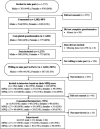Psychometric properties of the Thai Mood and Feelings Questionnaire (MFQ) for adolescent depression
- PMID: 33836780
- PMCID: PMC8035723
- DOI: 10.1186/s13034-021-00372-8
Psychometric properties of the Thai Mood and Feelings Questionnaire (MFQ) for adolescent depression
Abstract
Background: The Mood and Feelings Questionnaire (MFQ) is a widely used screening tool for child and adolescence depression but has not been validated with young people in Thailand. This study aimed to assess the reliability and validity and to determine the optimal clinical cut-off of the Thai MFQ.
Methods: The Thai MFQ was evaluated in two parts. In part 1, The MFQ was translated and back translated into the Thai language and piloted on a small number of Thai adolescents. Then 1275 young people aged 12-18 years from three secondary schools in Thailand completed the MFQ and related measures of depression. In part 2, 138 students were invited to take part in a structured diagnostic interview (the Thai translation of the Kiddie Schedule for Affective Disorders and Schizophrenia for School-Age Children -Present and Lifetime Version (the K-SADS-PL). Of those, 103 students were interviewed and completed the Thai MFQ a second time to assess test-retest reliability. Receiver Operating Characteristics (ROC) analyses were conducted to evaluate diagnosis accuracy and examine the optimal cut-off score of the Thai MFQ.
Results: The Thai MFQ had excellent internal consistency (α = 0.92) and good to moderate test-retest reliability in 2-week and 4-week intervals. The Thai MFQ also had good convergent validity with related measures of depression. The ROC analyses demonstrated that the Thai MFQ also had excellent accuracy distinguishing between depressed and non-depressed adolescents [AUC = 0.95, 95% CI [0.92, 0.99]. A total score of 28 on the Thai MFQ was the optimal cut-off score (sensitivity was 0.97 and specificity was 0.83).
Discussion: The Thai MFQ demonstrated excellent psychometric properties and accurately distinguished between depressed and non-depressed adolescents. It is appropriate to use as a screening measure to identify adolescents with depression in community settings in Thailand.
Keywords: Adolescence; Depression; Measurement; Psychometric properties; Self-report.
Conflict of interest statement
The authors declare that they have no conflict of interest.
Figures
References
-
- WHO. Depression and Other Common Mental Disorders Global Health Estimates. 2017 [cited 2020 Feb 25]. p. 6–14. Available from: https://apps.who.int/iris/bitstream/handle/10665/254610/WHO-MSD-MER-2017...
-
- Rudolph KD, Flynn M. Depression in Adolescents. In: Gotlib IH, Hammen CL, editors. Handbook of Depression Third Edition. 3. New York: Guilford Press; 2014. pp. 391–402.
LinkOut - more resources
Full Text Sources
Other Literature Sources


